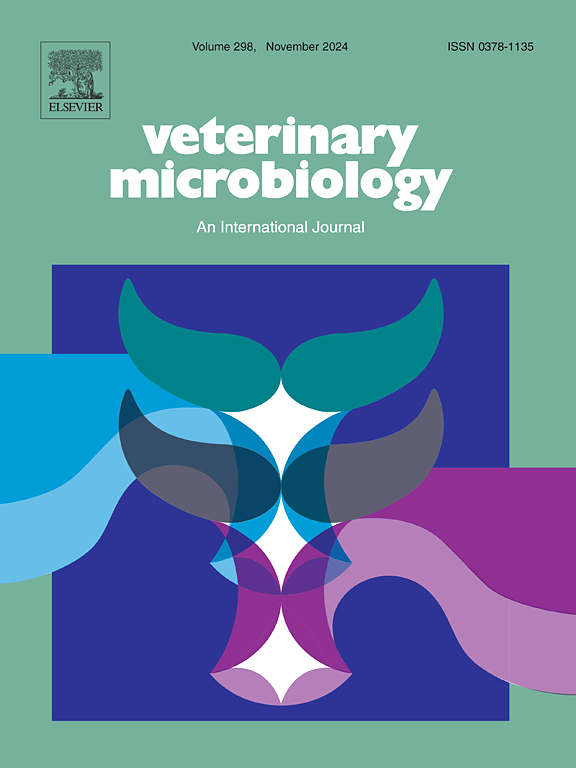Recombinant probiotic Escherichia coli delivers the polymeric protein of swine influenza virus for protection
IF 2.4
2区 农林科学
Q3 MICROBIOLOGY
引用次数: 0
Abstract
Swine influenza virus invades the host through the respiratory mucosa, which severely restricts the development of the pig breeding industry. To construct monomeric and trimeric vaccines, we developed recombinant Escherichia coli Nissle 1917 (EcN) strains that express the receptor binding site (RBS) of the hemagglutinin (HA) antigen from H1N1 swine influenza virus. After the mucosal immunization of mice, we found that probiotics activated CD40 and CD86 in DCs and increased the levels of IL-4 and IFN-γ secretion by T cells. Furthermore, the probiotics improved the function of the mucosal immune system, increased the level of SIgA, level of IgG and number of B220+IgA+, and activated germinal center B cells. The challenge experiment revealed that the probiotics alleviated weight loss, reduced pathological injury to the lungs, and protected the mice from virus infection. We also observed that the serum neutralizing antibodies of immunized piglets significantly increased, which reduced the shedding frequency of swine influenza virus in the nose of the piglets and reduced the pathological damage by activating the T cell immune response in infected piglets. Thus, the constructed probiotics are promising candidates for effective non-traditional swine influenza vaccines.
重组益生菌大肠杆菌提供猪流感病毒聚合蛋白保护。
本文章由计算机程序翻译,如有差异,请以英文原文为准。
求助全文
约1分钟内获得全文
求助全文
来源期刊

Veterinary microbiology
农林科学-兽医学
CiteScore
5.90
自引率
6.10%
发文量
221
审稿时长
52 days
期刊介绍:
Veterinary Microbiology is concerned with microbial (bacterial, fungal, viral) diseases of domesticated vertebrate animals (livestock, companion animals, fur-bearing animals, game, poultry, fish) that supply food, other useful products or companionship. In addition, Microbial diseases of wild animals living in captivity, or as members of the feral fauna will also be considered if the infections are of interest because of their interrelation with humans (zoonoses) and/or domestic animals. Studies of antimicrobial resistance are also included, provided that the results represent a substantial advance in knowledge. Authors are strongly encouraged to read - prior to submission - the Editorials (''Scope or cope'' and ''Scope or cope II'') published previously in the journal. The Editors reserve the right to suggest submission to another journal for those papers which they feel would be more appropriate for consideration by that journal.
Original research papers of high quality and novelty on aspects of control, host response, molecular biology, pathogenesis, prevention, and treatment of microbial diseases of animals are published. Papers dealing primarily with immunology, epidemiology, molecular biology and antiviral or microbial agents will only be considered if they demonstrate a clear impact on a disease. Papers focusing solely on diagnostic techniques (such as another PCR protocol or ELISA) will not be published - focus should be on a microorganism and not on a particular technique. Papers only reporting microbial sequences, transcriptomics data, or proteomics data will not be considered unless the results represent a substantial advance in knowledge.
Drug trial papers will be considered if they have general application or significance. Papers on the identification of microorganisms will also be considered, but detailed taxonomic studies do not fall within the scope of the journal. Case reports will not be published, unless they have general application or contain novel aspects. Papers of geographically limited interest, which repeat what had been established elsewhere will not be considered. The readership of the journal is global.
文献相关原料
公司名称
产品信息
索莱宝
neutral gum
索莱宝
BSA
 求助内容:
求助内容: 应助结果提醒方式:
应助结果提醒方式:


